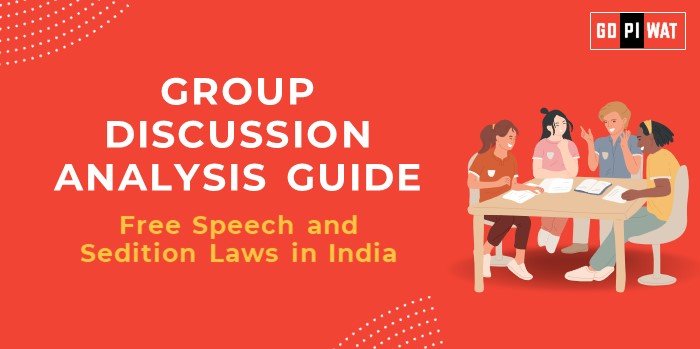📋 GD Analysis Guide: Free Speech and Sedition Laws in India
🌐 Introduction
In the world’s largest democracy, the delicate balance between safeguarding national security and upholding the fundamental right to free speech remains a contentious issue.
India’s sedition law, encapsulated in Section 124A of the Indian Penal Code, was introduced in 1870 during British colonial rule to suppress dissent. Despite its colonial origins, the law persists in modern India, leading to debates over its relevance and application in a democratic society.
📊 Quick Facts and Key Statistics
- 📜 Constitutional Provision: Article 19(1)(a) of the Indian Constitution guarantees the right to freedom of speech and expression.
- 📈 Sedition Cases Surge: Between 2014 and 2021, there was a 28% annual increase in sedition cases, particularly against critics and protesters.
- ⚖️ Conviction Rates: Of the 548 individuals arrested for sedition between 2015 and 2020, only 12 were convicted in seven cases.
- 📉 Global Press Freedom Ranking: In the 2023 World Press Freedom Index, India ranked 161 out of 180 countries.
- ⚖️ Judicial Intervention: In May 2022, the Supreme Court of India suspended the application of Section 124A, acknowledging concerns over its misuse.
🎯 Stakeholders and Their Roles
- 🏛️ Government: Tasked with maintaining national security while ensuring citizens’ constitutional rights.
- ⚖️ Judiciary: Interprets the constitutionality of laws and addresses their misuse.
- 📰 Media and Journalists: Serve as watchdogs, highlighting issues and holding power to account.
- 🌍 Civil Society and Activists: Advocate for human rights and legal reforms.
- 👥 Citizens: Exercise free speech and participate in democratic processes.
🏆 Achievements and ⚠️ Challenges
🏆 Achievements
- ⚖️ Judicial Oversight: The Indian judiciary has actively intervened to prevent misuse of sedition laws, as in Kedar Nath Singh vs. State of Bihar (1962).
- 📣 Public Awareness: Civil society and media campaigns have amplified the discourse around the misuse of sedition laws.
- 🌍 Global Engagement: International scrutiny and India’s democratic standing have prompted discussions on aligning sedition laws with global norms.
⚠️ Challenges
- 🚨 Misuse of Laws: Sedition charges are often used to stifle dissent, target activists, and suppress opposition voices (e.g., the 2021 case against climate activist Disha Ravi).
- 📉 Low Conviction Rates: Despite numerous arrests, the conviction rate remains below 3%.
- ⚡ Erosion of Democratic Norms: India’s drop in press freedom rankings reflects challenges to free speech and the independence of journalism.
🌎 Global Comparisons
- 🇬🇧 United Kingdom: Repealed sedition laws in 2009, citing incompatibility with free speech.
- 🇺🇸 United States: Sedition is addressed under the First Amendment but strictly interpreted to avoid suppressing free speech.
- 🇸🇬 Singapore: Retains sedition laws, but their application is limited to acts that promote enmity or violence.
📖 Case Studies
- 🔍 AIIMS Cybersecurity Case (2022): Highlighted the tension between national security concerns and media reporting restrictions.
- 🌱 Kerala’s Activism Ecosystem: Demonstrates high public engagement in free speech movements and robust legal safeguards against arbitrary arrests.
🧠 Structured Arguments for Discussion
🔷 Supporting Stance
“Sedition laws are crucial for preserving national security in a diverse and sensitive country like India.”
🔶 Opposing Stance
“The law is a colonial relic that violates the democratic right to dissent and must be repealed or reformed.”
⚖️ Balanced Perspective
“While sedition laws can help maintain order, reforms are essential to prevent misuse and align with democratic values.”
📊 Effective Discussion Approaches
- 🗨️ Opening Approaches: Quote Supreme Court remarks from the suspension of Section 124A or begin with statistical comparisons of sedition law applications versus convictions.
- 🛠️ Counter-Argument Handling: Use international examples (e.g., UK’s repeal) to argue for reforms or cite India’s democratic foundations to advocate against misuse.
📌 Strategic Analysis of Strengths and Weaknesses
- ✅ Strengths: Judicial checks, public awareness, and international attention.
- ❌ Weaknesses: Risk of misuse, weak convictions, and chilling effects on free speech.
- 🌟 Opportunities: Legal reform, advocacy for repealing outdated provisions.
- ⚠️ Threats: Rising authoritarian trends, reduced democratic space.
🏫 Connecting with B-School Applications
- 📈 Real-World Applications: Analyze the role of free speech in corporate communication, governance, and leadership ethics.
- ❓ Sample Questions:
- How do sedition laws impact India’s democratic image globally?
- Should businesses support free speech advocacy or maintain neutrality?
- 💡 Insights for B-School Students:
- Understand the ethical implications of free speech in leadership roles.
- Assess legal and societal risks for companies operating in contentious sectors.


